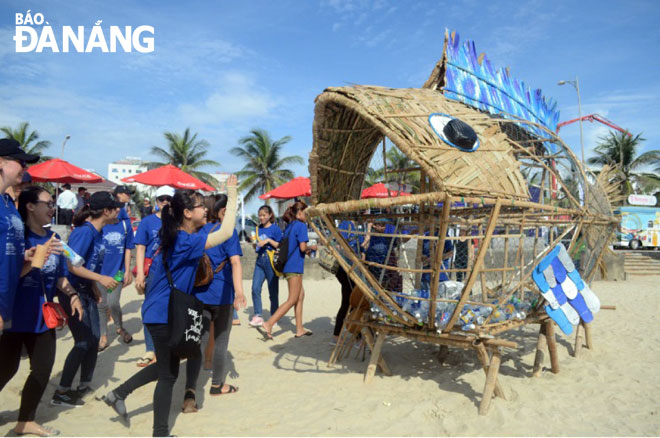WWF-initiated Plastic Smart Cities project launched in Da Nang
Da Nang, along with two other Vietnamese localities- Rach Gia và Phu Yen, have been eligible for the implementation of the Plastic Smart Cities project initiated by the World Wide Fund for Nature (WWF). In Da Nang, Thanh Khe District has been chosen to carry out this highly inviting project until 2025.
 |
| The placement of a creative sculpture featuring a Goby swallowing plastic waste in Da Nang aims to raise public awareness about the damage done by plastic materials to marine life. |
Under the project, by 2022, Da Nang will target at reducing plastic waste by 30% compared to 2020. At least three pollution hotspots in Thanh Khe District will be resolved. 100% of State management agencies in the district will not use water bottles and plastic straws in meetings, conferences, seminars and events. “The market says no to plastic bags’ model will be trialled at a traditional market.
By 2025, plastic waste generation in the Thanh Khe District will plunge by 50% against 2020. All of families, schools, businesses, offices and other organisation in the district will carry out waste classification at the source.
Besides, the district government has launched an action plan for plastic waste management in 2021 with a focus on raising public awareness of major impact of plastic items on the environment. At least 50% of the district-bassed coastal tourist sites and service areas will not use disposable plastic products. At least 50% of the total fishermen do not dispose of fishing gears and plastic garbage into the sea.
Plastic Smart Cities is a WWF initiative that supports a no plastic in nature agenda. Since 2018, the initiative has supported cities and coastal centers in taking bold action to stop plastic pollution, with a goal to reduce plastic leakage into nature by 30% by 2025.
The initiative seeks to grow to 1,000 Plastic Smart Cities, achieving no plastic in nature by 2030.
Today, an estimated 60% of plastic marine debris derives from urban centers, as polluted waterways carry plastic pollution to the ocean. Nearly half of all plastic products were in fact produced after the year 2000. This issue is only decades old, yet over 75% of all plastic ever produced is already waste.
While worldwide cities will rapidly increase their populace to account for two-thirds of the global population by 2050, they must urgently adopt smart solutions that reduce the collective impact of their prospering communities. This means preventing, minimising and managing plastic. Many good examples and initiatives are already underway; WWF seeks to accelerate these existing efforts by empowering cities around the world to become Plastic Smart.
By NGOC HA- Translated by A.T